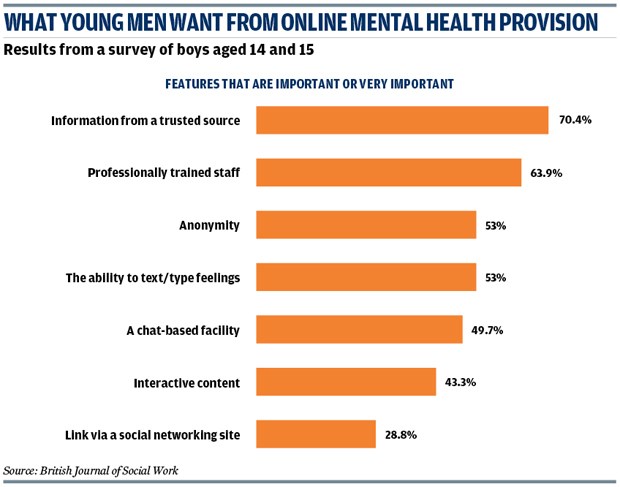Online Help-Seeking and the Mental Wellbeing of Adolescent Males
Charlotte Goddard
Monday, July 6, 2015
How the internet is changing the way young men seek support, as well as the changing role of the social worker in the digital world.
Published by: British Journal of Social Work, November 2014

SUMMARY
The dramatic increase in the level of mental ill-health among young people is a central concern for social workers. According to the World Health Organisation in 2012, up to 20 per cent of young people may experience mental health difficulties. Child and Adolescent Mental Health Services (CAMHS) have found it difficult to engage young people because of stigma, ignorance and peer pressure, with young males particularly hard to reach. This paper investigates how the internet is changing the way young men seek support, as well as the changing role of the social worker in a digital world.
Online help-seeking is quick, accessible, cheap and confidential but the poor quality of information available online has been highlighted in previous research and little is known about the impact of the internet on mental wellbeing. This study - Social Work and Social Media: Online Help-Seeking and the Mental Wellbeing of Adolescent Males - uses a sample of 527 adolescent males aged 14 and 15 in Northern Ireland, reflecting the "at risk"
age range for boys and young men and targeting one of the first cohorts to have grown up with online technology.
The survey found 42 per cent of respondents used the internet to find health information. Of this group, 57 per cent used the internet to find information on physical health and 29 per cent for mental health. A quarter of those who had used the internet to find health information said they would not tell anyone they had sought help.
When young people were asked how they would go about finding health information online, search engines were the preferred route, with 57 per cent saying they were likely or very likely to use them. Just under half - 49 per cent - would use social networking sites but only 24 per cent would turn to NHS or local government websites.
Just over a quarter of the entire sample - 26 per cent - said they would find using online mental health services easier than speaking to someone face to face, with those who were already looking for information online more likely to prefer online services. A comparison of those who used the internet to search for health information with those who did not, found searching online for health information was not associated with a decrease in mental wellbeing.
The sample was split into three groups - those who searched for information online but did not tell anyone, those who searched for information online and then told someone in real life, and those who told someone in real life and then searched online for information. Overall the first group had the lowest mental wellbeing, showing the benefits of disclosing problems to others. Young people who had more online friends were more likely to use social media to access health information.
IMPLICATIONS FOR PRACTICE
Online technology can assist adolescent males in accessing information with results suggesting those using both online and face-to-face services gain greatest mental health benefits. In terms of social work practice, professionals should expand their knowledge of online mental health provision, particularly high-quality provision available outside of office hours. This study suggests work needs to be done to improve the quality of government health and social care websites if adolescent males are to engage with them as a first point of support.
FURTHER READING
- Understanding Adolescence, Research in Practice, November 2014. This briefing and accompanying tool for frontline social care practitioners outlines key areas of development in adolescence.
- Risk-taking Adolescents and Child Protection, Research in Practice, January 2014. A strategic briefing outlining recent research on adolescent development. Emerging practice examples are highlighted and links provided for relevant papers and other sources of information.
- That Difficult Age: Developing a More Effective Response to Risks in Adolescence, Research in Practice, November 2014. An evidence review looking at the risks facing some adolescents in the UK today to inform a distinctive adolescent-centred approach to working with adolescents.
- More resources supporting work with adolescents and relevant in-house workshops are available to Research in Practice partners www.rip.org.uk




